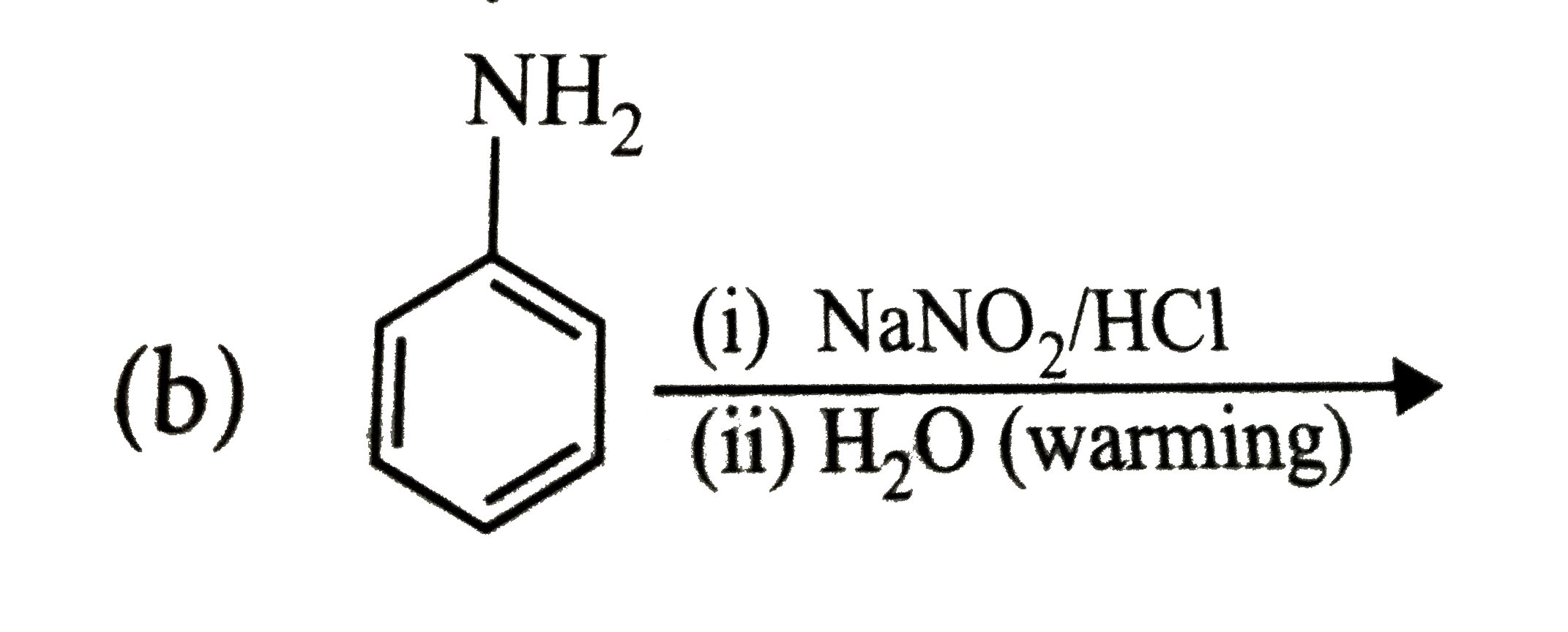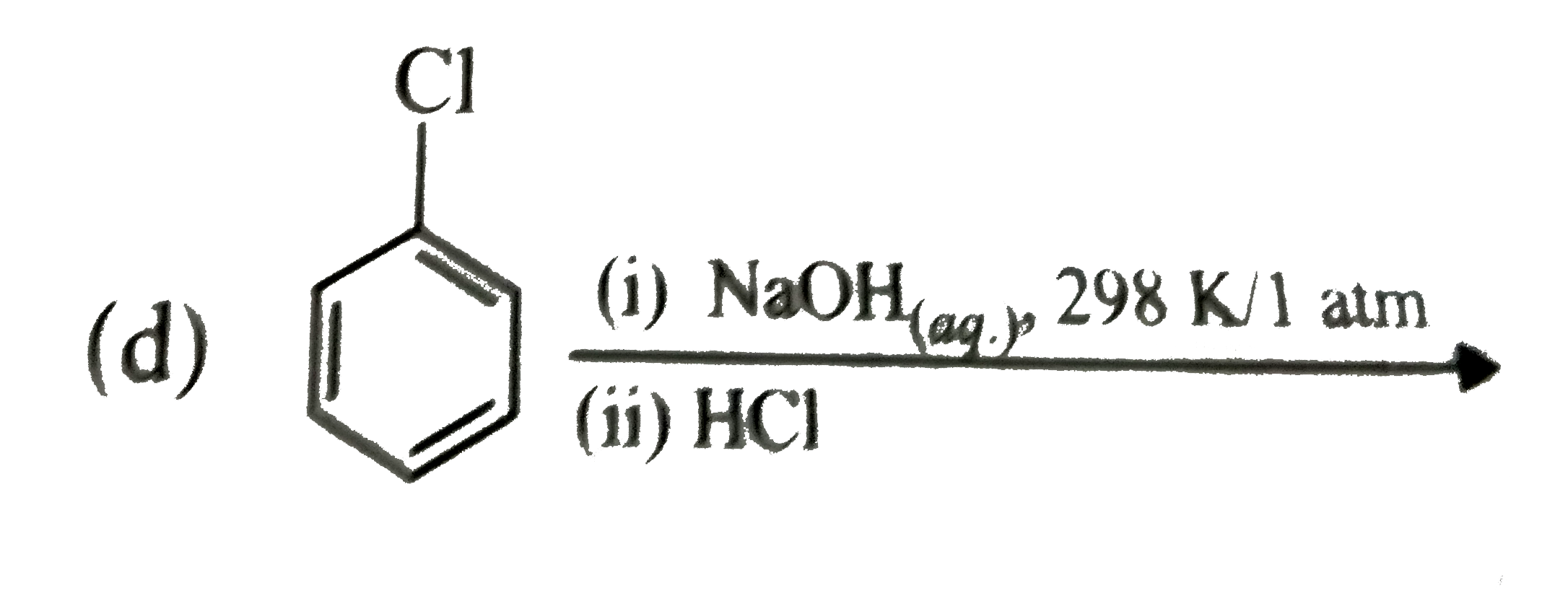Which of the following alcohols will yield the corresponding alkyl chloride on reaction with concentrated HCl at room temperature?
CH3CH2−CH2−OH
CH3CH2−C∣CH3H−CH2OH
CH3CH2−C∣CH3H−CH2OH
CH3CH2−CH3∣C∣CH3−OH
The correct Answer is:D
To determine which alcohol will yield the corresponding alkyl chloride upon reaction with concentrated HCl at room temperature, we need to analyze the stability of the carbocation that forms during the reaction. Here’s a step-by-step breakdown of the solution:
Step 1: Understanding the Reaction Mechanism
When an alcohol reacts with concentrated HCl, the hydroxyl group (-OH) is protonated to form a better leaving group, water (H2O). This step is crucial because the stability of the resulting carbocation influences the reaction's outcome.
Hint: Remember that the stability of carbocations increases with the degree of substitution: tertiary > secondary > primary.
Step 2: Protonation of the Alcohol
The alcohol (R-OH) reacts with HCl. The proton (H+) from HCl attaches to the oxygen of the hydroxyl group, converting it into a better leaving group (H2O).
Hint: Identify the alcohol structure and visualize the protonation of the -OH group.
Step 3: Formation of the Carbocation
Once water leaves, a carbocation is formed. The stability of this carbocation is key. Tertiary carbocations are more stable than secondary, which are more stable than primary.
Hint: Draw the structure of the carbocation formed after the leaving group departs.
Step 4: Evaluating Carbocation Stability
For each alcohol option provided, evaluate the carbocation that would form:
- If it is a primary carbocation, it is less stable.
- If it is a secondary carbocation, it is more stable.
- If it is a tertiary carbocation, it is the most stable.
Hint: Compare the carbocation structures for each option to determine which one is the most stable.
Step 5: Identifying the Most Stable Carbocation
After evaluating the carbocations, identify which alcohol leads to the formation of the most stable carbocation. This will be the alcohol that yields the highest amount of alkyl chloride when reacted with HCl.
Hint: Look for the alcohol that forms a tertiary carbocation, as it will provide the best yield of the corresponding alkyl chloride.
Step 6: Conclusion
Based on the stability of the carbocations formed from each alcohol, the correct option is the one that leads to the formation of the most stable carbocation, which is typically a tertiary carbocation.
Final Answer: The correct option for this question should be D, as it yields the most stable carbocation and thus the highest yield of the corresponding alkyl chloride.
When an alcohol reacts with concentrated HCl, the hydroxyl group (-OH) is protonated to form a better leaving group, water (H2O). This step is crucial because the stability of the resulting carbocation influences the reaction's outcome.
The alcohol (R-OH) reacts with HCl. The proton (H+) from HCl attaches to the oxygen of the hydroxyl group, converting it into a better leaving group (H2O).
Once water leaves, a carbocation is formed. The stability of this carbocation is key. Tertiary carbocations are more stable than secondary, which are more stable than primary.
For each alcohol option provided, evaluate the carbocation that would form:
- If it is a primary carbocation, it is less stable.
- If it is a secondary carbocation, it is more stable.
- If it is a tertiary carbocation, it is the most stable.
After evaluating the carbocations, identify which alcohol leads to the formation of the most stable carbocation. This will be the alcohol that yields the highest amount of alkyl chloride when reacted with HCl.
Based on the stability of the carbocations formed from each alcohol, the correct option is the one that leads to the formation of the most stable carbocation, which is typically a tertiary carbocation.
Topper's Solved these Questions
- HALOALKANES AND HALOARENESBook:NCERT FINGERTPS ENGLISHChapter:HALOALKANES AND HALOARENESExercise:Assertion and reason
Explore 15 Videos
- HALOALKANES AND HALOARENESBook:NCERT FINGERTPS ENGLISHChapter:HALOALKANES AND HALOARENESExercise:Polyhalogen Compounds
Explore 6 Videos
- HALOALKANES AND HALOARENESBook:NCERT FINGERTPS ENGLISHChapter:HALOALKANES AND HALOARENESExercise:Higher order thinking skills
Explore 8 Videos
- GENERAL PRINCIPLES AND PROCESSES OF ISOLATION OF ELEMENTSBook:NCERT FINGERTPS ENGLISHChapter:GENERAL PRINCIPLES AND PROCESSES OF ISOLATION OF ELEMENTSExercise:Assertion And Reason
Explore 15 Videos
- POLYMERS Book:NCERT FINGERTPS ENGLISHChapter:POLYMERS Exercise:NCERT Exemplar
Explore 9 Videos
Similar Questions
Knowledge Check
Which of the following reactions will not yield phenol ?
A B
B C
C D
D
Which of the following reactions will yield 2, 2-dibromopropane ?
View SolutionWhich of the following acids will give maximum yield of alkyl chloride in Huns diecker reaction
View SolutionWhich of the following reactions does not yield an amine?
View SolutionWhich of the following reactions is used to prepare sulphuryl chloride ?
View SolutionWhich of the following alkane is synthesised from single alkyl halide by wurtz reaction:-
View SolutionWhich of the following reactions will not yield alcohol as the major product ?
View SolutionWhich of the following reactions give alkylation product :
View Solution

